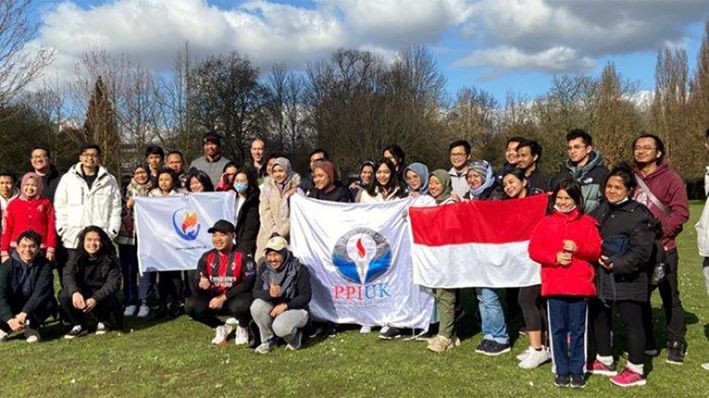Popular Reads
Top Results
Can't find what you're looking for?
View all search resultsPopular Reads
Top Results
Can't find what you're looking for?
View all search resultsTransnational education: An opportunity for Indonesia's future
The value of TNE partnership lies beyond the economic matrix and can be felt by institutions, students, and communities at large.
Change text size
Gift Premium Articles
to Anyone
A
ccording to the UNESCO Institute for Statistics, Indonesia has 55,961 students studying abroad, which marks a 21 percent growth since 2014. Increasingly, Indonesian students are considering a wider variety of study destinations, as well as new options to benefit from higher education offered by other countries. This is where transnational education fills the gap.
The notion that higher education could jointly be delivered by two or more institutions from different countries has been around for some time. The Code of Good Practice in the Provision of Transnational Education (TNE) issued by the Council of Europe in 2001, later revised by UNESCO and the Council of Europe in 2007, defines transnational education as:
“All types and modes of delivery of higher education study programs, or set of courses of study, or education services (including those of distance education) in which the learners are located in a country different from the one where the awarding institution is based. Such programs may belong to the education system of a State different from the State in which it operates, or may operate independently of any national education system.”
Fast forward to 2023, TNE types, modes of delivery, and sizes have grown significantly. Articulation, credit transfer, franchise, branch campus, dual or joint degree, distance delivery, and progression such as 2 +2 are part of today’s TNE offers for students around the world.
The UK is a leading provider of transnational education. The sixth edition of Universities UK’s report on The scale of UK higher education transnational education shows TNE is growing rapidly, as demand for higher education is increasing worldwide. In 2020–21, 510,835 students from 228 countries and territories were enrolled in TNE programs from 162 UK providers, a 12.7 percent increase from the previous year.
A recent study commissioned by the British Council involved extensive literature reviews, and interviews with government officials, regulatory bodies, and higher education stakeholders in 12 countries and territories. We found that the value of TNE partnership lies beyond the economic matrix and can be felt by institutions, students, and communities at large.
On a global level, TNE partnerships add value in widening access to education, increase social and economic mobility, and therefore are a key driver of the United Nations Sustainable Development Goals (SDGs), especially in improving the quality of education and reducing inequality.
Nationally, TNE can reduce brain drain and strengthen higher education internationalization beyond the small proportion of globally mobile students estimated to be just 2 percent of the world’s tertiary education enrolment. National governments are using TNE to attract international students from surrounding countries, boost education exports, and attract international talents.
For universities, TNE offers opportunities to enhance their international outlook. By collaborating with international institutions, home universities can offer their students access to world-class teaching, cutting-edge research, and innovative pedagogical approaches. At the same time, transnational education can help strengthen the capacity of local institutions, building their faculty, facilities, and research capabilities.
Collaborative teaching and learning at the postgraduate level are widely valued for contributing to capacity building in niche subject areas. Producing collaborative research outputs is seen as a natural extension and by-product of TNE partnerships. Policymakers identify this potential link as a rationale for supporting TNE partnerships in their countries.
The report highlights seven TNE’s values and impacts across countries including capacity building and institutional development; developing teaching capacity in institutions and strengthening the academic talent pool in countries; enhancing students’ experience and improving graduate employability; enhancing research capacity; reputational value; building sustainable communities; and economic development.
Indonesia is a relative newcomer in embracing TNE compared to other ASEAN countries such as Malaysia and Singapore. But increasingly TNE is accepted as one of the options for Indonesian students to gain an internationally recognized degree. About 900 Indonesian students are currently enrolled in UK TNE programs.
A more supportive regulatory environment helps to grow TNE partnerships between Indonesian universities and their overseas partners including the UK. We are pleased to see an increased appetite from the Indonesian Government to welcome TNE partnerships and the incentives provided such as those offered by the Special Economic Zones, resulting in a wide range of TNE modes of delivery being allowed to be delivered in Indonesia including branch campuses. Indonesian students can also avail themselves of foundation programs on offer as a pathway to study overseas.
Government strategies worldwide recognize that a quality higher education sector is necessary for national competitiveness. The value of TNE is seen through its contribution to building capacity in local institutions and producing graduates with knowledge and skills relevant to local and/or regional economic development. This complements President Jokowi’s focus on human capital development, key to Indonesia’s future.
Therefore, it is encouraging to see the government of Indonesia picking up the pace in TNE partnerships. One of the eight key performance indicators (KPIs) set by Indonesia’s Education, Culture, Research, and Technology Ministry encourages Indonesian universities to work with overseas partners. Even more encouraging, as part of the BPI Scholarship, the ministry is also committed to providing scholarships for Indonesian students studying TNE programs.
As the Indonesian Government’s Kampus Merdeka (Emancipated Learning) program continues to give freedom for students to choose multiple pathways to develop competencies, we see great potential for Transnational Education to offer Indonesian students the flexibility of learning and to increase their chance of benefitting from some of the best education systems the world has to offer.
Ultimately, the value of transnational education in Indonesia lies in its ability to build a strong and vibrant higher education sector, equipping Indonesian students with the knowledge, skills, and experience they need to compete and succeed in the global economy.
As we look to the future, let us embrace the opportunities that transnational education offers, and work together to build a brighter and more prosperous future for Indonesia and its people.
***
The writer is the country director of Indonesia and Southeast Asia lead, British Council.











